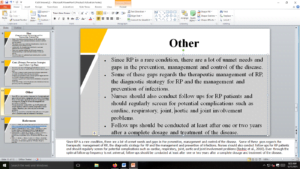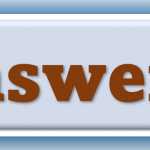For this assignment, you will develop a presentation on a realistic clinical case on a topic that is of interest to you. And then, use Canvas Studio’s Screen Capture feature to record (voice-over) your presentation.
How do I record a Canvas Studio video with a webcam in a course?
Content Requirements
You will create a PowerPoint presentation with a realistic case study and include appropriate and pertinent clinical information that will be covering the following:
- Subjective data: Chief Complaint; History of the Present Illness (HPI)/ Demographics; History of the Present Illness (HPI) that includes the presenting problem and the 8 dimensions of the problem; Review of Systems (ROS)
- Objective data: Medications; Allergies; Past medical history; Family history; Past surgical history; Social history; Labs; Vital signs; Physical exam.
- Assessment: Primary Diagnosis; Differential diagnosis
- Plan: Diagnostic testing; Pharmacologic treatment plan; Non-pharmacologic treatment plan; Anticipatory guidance (primary prevention strategies); Follow up plan.
- Other: Incorporation of current clinical guidelines; Integration of research articles; Role of the Nurse practitioner
Submission Instructions:
- The presentation is original work and logically organized, formatted, and cited in the current APA style, including citation of references.
- The presentation should consist of 10-15 slides and less than 5 minutes in length.
- Incorporate a minimum of 4 current (published within the last five years) scholarly journal articles or primary legal sources (statutes, court opinions) within your work. Journal articles and books should be referenced according to APA style (the library has a copy of the APA Manual).
Requirements: 10-15 slides
Answer preview
ØNon-pharmacologic Treatment Plan:
ØLifestyle modifications: Elevating the head of the bed, avoiding large meals, reducing alcohol and tobacco consumption, and weight loss.
ØDietary changes: Avoiding trigger foods and beverages (e.g., spicy foods, citrus, caffeine).
ØAnticipatory Guidance (Primary Prevention Strategies):
ØEducate the patient about trigger factors and lifestyle modifications
ØEmphasize the importance of maintaining a healthy weight and quitting smoking.
-
[Slide 12 of 14]
-

Non-pharmacologic treatment plan


